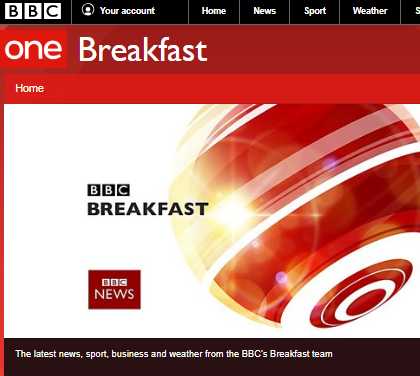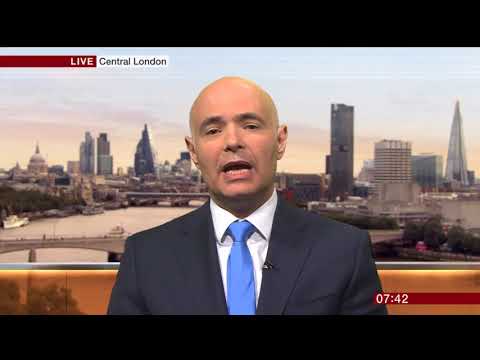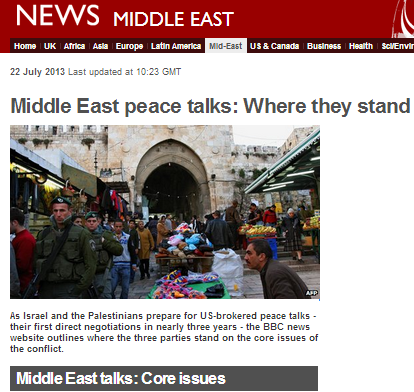Viewers of the May 15th edition of BBC Breakfast (aired on BBC One and BBC News) saw an interview conducted by Louise Minchin with a representative from the Israeli embassy in London, Michael Freeman.
Although the interview was presented as being about “violence in Gaza where 58 people were killed by Israeli troops”, the footage that viewers were shown throughout nearly a quarter of the item was in fact not filmed in the Gaza Strip and did not reflect the events along the border.
At 01:16 in the video below, Louise Minchin stated that a baby had been killed on May 14th.
Minchin: “Fifty-eight people have been killed. We understand that some of them were children, including a baby. Is this not excessive force?”
The Hamas-run Gaza health ministry did indeed claim that eight children and a baby had been killed:
“The Gaza Strip’s Hamas-run health ministry said Tuesday morning that a baby was among those killed during violent border clashes along the territory’s border with Israel the previous day, bringing the overall death toll in the day’s bloody events to 60. […]
The baby died from inhaling tear gas fired at Palestinian protesters, the health ministry said.
Eight-month-old Leila al-Ghandour was exposed to gas fired by Israeli forces east of Gaza City, it said.”
However, AP later reported that:
“A Gaza health official cast doubt Tuesday on initial claims that an 8-month-old baby died from Israeli tear gas fired during mass protests on the Gaza border with Israel.
A Gazan doctor told the Associated Press that the baby, Layla Ghandour, had a preexisting medical condition and that he did not believe her death was caused by tear gas. He spoke on condition of anonymity because he was not allowed to disclose medical information to the media.
Layla’s family claimed Tuesday that the baby had ended up in the area of the protest as a result of a mixup, the AP reported added. The Gaza Health Ministry initially counted her among several dozen Palestinians killed Monday.”
The New York Times reported that:
“The child’s parents have given interviews to journalists and aid workers in Gaza recounting how their daughter died. A tweet from Steve Sosebee, who works with the Palestine Children’s Relief Fund, suggested that they confirmed their daughter had an underlying health condition.”
This would not be the first time that BBC audiences have been told that a Palestinian baby had died from tear-gas fired by Israeli soldiers without the allegation having been confirmed.
At 02:47 Minchin returned to a popular BBC theme:
Minchin: “No Israelis as far as we understand were injured yesterday. Fifty-eight Palestinians killed. Is this proportionate?”
As we have frequently had cause to note here in the past, the terms ‘proportionate’ and ‘disproportionate’ have long been abused by BBC journalists who wrongly use the every-day meaning of those terms to imply that Israel has breached legal limitations on the use of force in combat.
“In everyday usage, the word “proportional” implies numerical comparability, and that seems to be what most of Israel’s critics have in mind: the ethics of war, they suggest, requires something like a tit-for-tat response. So if the number of losses suffered by Hezbollah or Hamas greatly exceeds the number of casualties among the Israel Defense Forces (IDF), then Israel is morally and perhaps legally culpable for the “disproportionate” casualties.
But these critics seemed largely unaware that “proportionality” has a technical meaning connected to the ethics of war.”
By promoting the false notion that ‘proportionate’ means equality in death or suffering, Louise Minchin conveyed to BBC audiences that Israel must be in the wrong because “no Israelis… were injured”.
Related Articles:
BBC World Service ‘Newshour’: using ‘alleged’ and ‘fact’ for framing
BBC’s Gaza casualty figures source shows its reliability
BBC Radio 4 dusts off the ‘expert’ hats and ‘disproportionate’ meme
BBC World Service dusts off ‘disproportionate’
BBC’s Evan Davis misleads on BDS, proportionality in warfare
Resources:
BBC Breakfast contact details





